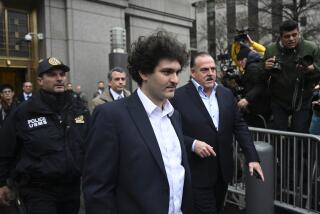Outside Help Sought by Drexel Burnham : Wall Street: Securities firm battered by criminal troubles and slumping junk-bond market.
- Share via
NEW YORK — Drexel Burnham Lambert Inc. said today that it is seeking a major investor or merger partner after falling on hard times because of its criminal troubles and the slumping junk-bond market.
In a statement, Drexel said senior members of the firm have concluded that it should seek outside assistance.
“The unsettled markets, particularly in the high-yield area, have adversely affected the liquidity of our parent corporation, Drexel Burnham Lambert Group. . . ,” Drexel said.
Drexel has long been rumored on Wall Street to be in serious financial difficulty and seeking an outside investor or partner.
Such a move would conclude one of the most dramatic turnarounds in Wall Street history. Drexel was the emblem of the high-flying, takeover-driven 1980s, and the firm made a profit of $522.5 million on revenue of $5.3 billion in 1986.
But Drexel reported a loss of about $40 million for last year, in which it pleaded guilty to six felonies and paid $650 million to the federal government to settle wide-ranging securities fraud charges and avoid a trial.
The firm earned more than $400 million in 1987 but reported a loss of $166.7 million in 1988, which included a charge to cover the $650-million payment to the government.
The firm’s net capital position was said to be of concern because a slumping capital base could put it in jeopardy with federal regulators. Drexel’s equity capital has fallen from a peak of $1.4 billion in recent years because of the government payments and withdrawal of stakes in the firm by departing executives.
The closely held Wall Street firm said today that the parent company has a consolidated net worth of more than $800 million. It said the securities business subsidiary, Drexel Burnham Lambert Inc., “continues to have good liquidity and has satisfactory excess regulatory capital.”
Drexel said it is “taking appropriate action to maximize liquidity” but it did not elaborate.
The firm had been battered by the charges in the government’s lengthy investigation of Wall Street securities fraud. The inquiry now focuses on the former head of Drexel’s highly productive high-yield “junk bond” division, Michael Milken, who is under indictment.
Before Drexel’s troubles mushroomed, Milken reportedly received $550 million in total compensation in one single year, 1987.
Drexel was also hard hit by the slump in the nation’s $210-billion junk bond market last fall, which followed the collapse of a takeover deal for United Airlines parent UAL Corp. The market has yet to recover, and Drexel had to write down the value of its junk-bond portfolio.
Wall Street analysts said they are not surprised by the announcement, adding that they expect Drexel to try to sell a chunk of its business or a general stake rather than the entire firm.
“I don’t know if anything is too drastic,” said securities industry analyst Lawrence Eckenfelder of Prudential-Bache Securities Inc. in San Francisco. “Selling a piece of the firm would be the best way for them to go.”
More to Read
Inside the business of entertainment
The Wide Shot brings you news, analysis and insights on everything from streaming wars to production — and what it all means for the future.
You may occasionally receive promotional content from the Los Angeles Times.










